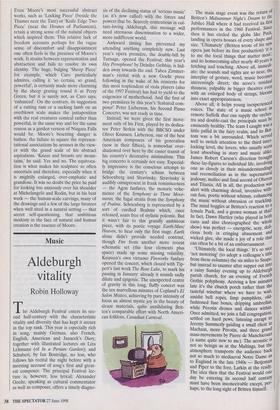Music
Aldeburgh vitality
Robin Holloway
The Aldeburgh Festival enters its sec- ond half-century with the characteristic vitality and diversity that has kept it secure in the top rank. This year is especially rich in song, mainly German, also French, English, American and Janacek's Diary, together with illustrated lectures on Liza Lehmann (of In a Persian Garden); and Schubert, by Ian Bostridge, no less, who follows his recital the night before with a morning account of song's first and great- est composer. The principal Festival lec- ture is, however, less lyrical: Alexander Goehr, speaking as cultural commentator as well as composer, offers a timely diagno- sis of the declining status of 'serious music' (as it's now called) with the forces and powers that be. Scarcely contentious in cul- ture-loving Aldeburgh, this message will need strenuous dissemination to a wider, more indifferent world.
Awkward timing has prevented my attending anything completely new. Last year's opera premiere, the double-bill by Turnage, opened the Festival; this year's Hey Persephone! by Deirdre Gribbin, is hid- den away towards the end. Tabea Zimmer- man's recital with a new Goehr piece following in the wake of his concerto for this most resplendent of viola players (also of the 1997 Festival) has had to yield to the exigencies of motherhood. And the first of two premieres by this year's 'featured com- poser' Peter Lieberson, his Second Piano Concerto, was not ready in time.
Instead, we were given the first move- ment only of his First, played by its dedica- tee Peter Serkin with the BBCSO under Oliver Knussen. Lieberson, one of the best American composers of his generation (now in their fifties), is somewhat over- shadowed over here by the easier transit of his country's decorative minimalism. This big concerto is certainly not easy. Especial- ly impressive is the conscious attempt to bridge the century's schism between Schoenberg and Stravinsky. Stravinsky is audibly omnipresent in frank reminiscences — the Agon fanfares, the motoric vehe- mence of the Symphony in Three Move- ments, the fugal straits from the Symphony of Psalms. Schoenberg is represented by a sort of curdled Brahms which, once released, soars free of stylistic polemic. But it wasn't fair to this grandly ambitious piece, with its poetic voyage Earth/Man/ Heaven, to hear only the first stage. Earth alone didn't provide needed contrast, though Fire from another more recent schematic set (the four elements plus space) made up some missing volatility. Knussen's own virtuoso Fireworks fanfare opened the concert, which closed with Tip- pett's last work The Rose Lake, to mark his passing in January: already it sounds sadly dilute and epigonic. The unexpected centre of gravity in this long, fluffy concert was the ten marvellous minutes of Copland's El Salon Mexico, achieving by pure intensity of focus an almost mystic joy in the beauty of sleaze materials, quite annihilating Brit- ten's comparable effort with North Ameri- can folklore, Canadian Carnival. The main stage event was the return of Britten's Midsummer Night's Dream to the Jubilee Hall where it had received its first performances in the 1960 Festival. Since then it has circled the globe like Puck; landing in opera houses of every shape and size. 'Ultimately' (Britten wrote of his new opera just before its first production) 'it is to me the local things that matter most: and its homecoming after nearly 40 years is fetching and touching. Above all, immedi- ate: the sounds and sights are so near, the interplay of gesture, word, music becomes interestingly direct; the score's residual thinness, palpable in bigger theatres even with an enlarged body of strings, blooms into exact appropriateness. Above all, it helps young inexperienced voices. The state of a music school in remote Suffolk that can supply the orches- tra and double-cast the principals must be eminently healthy. The team I caught was 3 little pallid in the fairy realm, and its Bot- tom was a bit unrounded. Which servo well to switch attention to the third inter" locking level, the lovers, who usually seal least absorbing in story and music alike. James Robert Carson's direction brought these lay-figures to individual life, involving one as closely in their misunderstandings and reconciliation as in the supernatural jealousy, malice and final accord of Oberon and Titania. All in all, the production was alert with charming detail, inventive with- out fuss, poetic without whimsy, enhancing the music without obtrusion or truckling. The mind boggles at Britten's reaction to a_ female Puck, and a grown woman at that! In fact, Dawn Hartley (who played in both casts and also choreographed the whole show) was perfect — energetic, sexy, deli- cious both in cringing abasement and wicked glee, she made a joy of a role that can often be a bit of an embarrassment. 'Ultimately, the local things.' It's so nice `not motoring' (to adopt a colleague's title from these columns) the six miles to Snape, but instead to saunter after supper out int° a rainy Sunday evening up to Aldeburgh parish church, for an evening of French Gothic polyphony. Arriving a few minutes late it's the church porch rather than the tasteful winebar where we have to wait, amidst bell ropes, limp pamphlets, old- fashioned fuse boxes, dripping umbrellas, while Perotin drones and dances within. Once admitted, we join a full congregation, settled on hard pews, listening enrapt to Jeremy Summerly guiding a small choir In Machaut, more Perotin, and three grand mass-movements by Pierre de Manchicourt. (a name quite new to me). The acoustic Is not so benign as at the Maltings, but the atmosphere transports the audience back not so much to mediaeval Notre Dame as to England in the late 1940s — Betjeman and Piper to the fore, Larkin at the ready. The idea then that the Festival would one day be entering its second half century must have been inconceivable except, per- haps, to the long sight of Britten himself.


























































 Previous page
Previous page